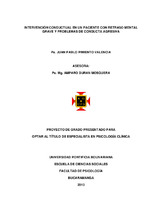Mostrar el registro sencillo del ítem
Intervención conductual en un paciente con retraso mental grave y problemas de conducta agresiva
| dc.contributor.advisor | Durán Mosquera, Amparo | |
| dc.contributor.author | Pimiento Valencia, Juan Pablo | |
| dc.coverage.temporal | 2013 | |
| dc.date.accessioned | 2020-08-31T19:18:10Z | |
| dc.date.available | 2020-08-31T19:18:10Z | |
| dc.date.issued | 2013 | |
| dc.identifier.uri | http://hdl.handle.net/20.500.11912/5886 | |
| dc.description | 57 páginas | spa |
| dc.description.abstract | Este articulo es un diseño de caso único en un paciente con retraso mental grave, de alta comorbilidad con un trastorno por déficit de atención con hiperactividad (tipo combinado) y Trastorno negativista desafiante. La intervención se llevó a cabo en una institución educativa especializada en el tratamiento de dificultades cognitivas, en la cual el paciente se encuentra semi-internado. La intervención incluyó la vinculación de los padres y su principal cuidador. La duración del tratamiento fue de seis meses, inicio el mes de agosto 2012 hasta el final de enero de 2013. Su fundamento teórico fue la teoría conductual (Análisis de la Conducta Aplicada). Las técnicas terapéuticas utilizadas en el paciente se enfocaron en: 1. Reforzar las conductas incompatibles; 2. Reducir los niveles de excitación fisiológica; 3. Extinguir reforzadores de la conducta agresiva; y 4. Castigar la conducta agresiva mediante castigos suaves. A su vez, las técnicas de entrenamiento aplicadas con los padres y su cuidador fueron: 1. El entrenamiento para reducir el comportamiento coercitivo y aumentar la frecuencia de refuerzos por comportamientos pro-sociales; y 2. El entrenamiento para el control de problemas de conducta del paciente y para motivar la conducta positiva. La intervención fue afectada por variables erróneamente estimadas y que afectaron los resultados, estas fueron: 1) la baja adherencia al tratamiento por parte de los padres y el abandono del puesto de trabajo de su principal cuidador durante la aplicación del diseño. Sin embargo, los hallazgos de la intervención sugieren un funcionamiento del análisis de la conducta aplicada para el tratamiento de personas con déficit cognitivo grave y problemas de conducta. Finalmente, este estudio de caso contribuye al cuerpo de información de intervenciones conductuales en retraso mental grave, especialmente en la identificación, control y manejo de variables desconocidas o variables erróneamente estimadas. | spa |
| dc.description.abstract | This article is a unique case design about a patient with severe mental retardation, which has high comorbidity with attention deficit hyperactivity disorder (combined type) and oppositional defiant disorder. The intervention has been applied in an educative center specialized in cognitive deficit treatments, were the patient is semi-institutionalized. The intervention included also the participation from his parents and his main personal care attendant. The length of the treatment was six months; it started at the beginning of August 2012 until the end of January 2013. The theoretical foundations were the principals of behavioral theory (applied behavior analysis). The therapeutic techniques applied in the patient were focused on: 1. reinforcement of incompatible behavior; 2. Decrease physical arousal; 3. Extinction of aggressive behavior reinforcement; 4. Mild-punishment of aggressive behavior. With regard to the training techniques applied to the parents and his main personal attendant they were: 1. Training to reduce coercive behavior and increase the frequency of pro-social reinforcement; and 2. Training to control the patient behavior and to promote positive his positive behavior. The intervention has been affected by wrongly estimated variables, as well they interfere with the outcomes, and those were: 1) the low parents' treatment compliance and the abandonment of the job from his main personal care attendant during the process. However, the findings during this intervention suggest that the applied behavior analysis works with patients with severe mental retardation and behavior aggressive problems. Finally, this case study adds to previous evidence about behavioral interventions on severe mental retardation, particularly in the identification, control and handling of unknown variables or wrongly estimated variables. | eng |
| dc.format.mimetype | application/pdf | |
| dc.language.iso | spa | |
| dc.publisher | Universidad Pontificia Bolivariana | spa |
| dc.rights | Attribution-NonCommercial-NoDerivatives 4.0 International | * |
| dc.rights.uri | http://creativecommons.org/licenses/by-nc-nd/4.0/ | * |
| dc.subject | Psicología clínica | spa |
| dc.subject | Deficiencia mental | spa |
| dc.subject | Agresividad (Psicología) | spa |
| dc.subject | Intervención psicológica | spa |
| dc.title | Intervención conductual en un paciente con retraso mental grave y problemas de conducta agresiva | spa |
| dc.type | Especialización | spa |
| dc.publisher.department | Escuela de Ciencias Sociales | spa |
| dc.publisher.program | Especialización en Psicología Clínica | spa |
| dc.type.hasVersion | publishedVersion | spa |
| dc.description.sectional | Bucaramanga | spa |
| dc.description.degreename | Especialista en Psicología Clínica | spa |
Ficheros en el ítem
Este ítem aparece en la(s) siguiente(s) colección(ones)
-
Trabajos de grado [6698]
Monografías, artículos, informes, proyecto de grado


